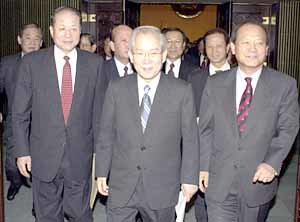Opposition GNP leader calls for end to ongoing tax probe on media
Opposition GNP leader calls for end to ongoing tax probe on media
Posted February. 06, 2001 17:09,

Rep. Lee Hoi-Chang, president of the opposition Grand National Party (GNP), demanded Tuesday that the government end its ongoing tax probe of newspaper and broadcasting companies, calling it ``suppression of the press.¡¯¡¯
Regardless of the legality of the tax audits, they are unjust when used for the purpose of controlling the press, he said. In an address during the National Assembly plenary session, Lee also said he does not oppose North Korean leader Kim Jong-Il¡¯s planned visit to Seoul because he hopes that a "real peace" will come to the Korean peninsula.
But he said he was closely monitoring the North Korean leader's statements on past events like the Korean War and the North¡¯s terrorist attacks.
Lee's remarks differed from earlier statements that he would support Kim¡¯s visit only in the event the North Korean leader offers an apology for North Korea's past actions.
The opposition leader proposed a ``grand political renovation¡¯¡¯ to wipe out corrupt ties between politicians and businessmen, political vendettas, regionalism and election campaign irregularities.
He said political reform is necessary if the nation wishes to put an end to the chronic inter-party strife and make a fresh start in the political sphere.
To end the ``vicious cycle of political revenge,¡¯¡¯ Lee said that institutional devices should be introduced to ensure the political neutrality of the police, prosecution, National Intelligence Agency and National Tax Service. He added that the heads of government agencies should be chosen through stringent confirmation hearings.
In his speech, Lee also voiced opposition to the proposed revision of the National Security Law, saying North Korea¡¯s intentions were still unclear, and demanded that the government seek to privatize financial institutions in which public funds were injected.
Lee called for deregulatory steps to facilitate an improved business climate and said that the public school system should be reformed through an increase in financing to the level of 6 percent of GDP.







